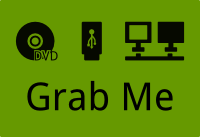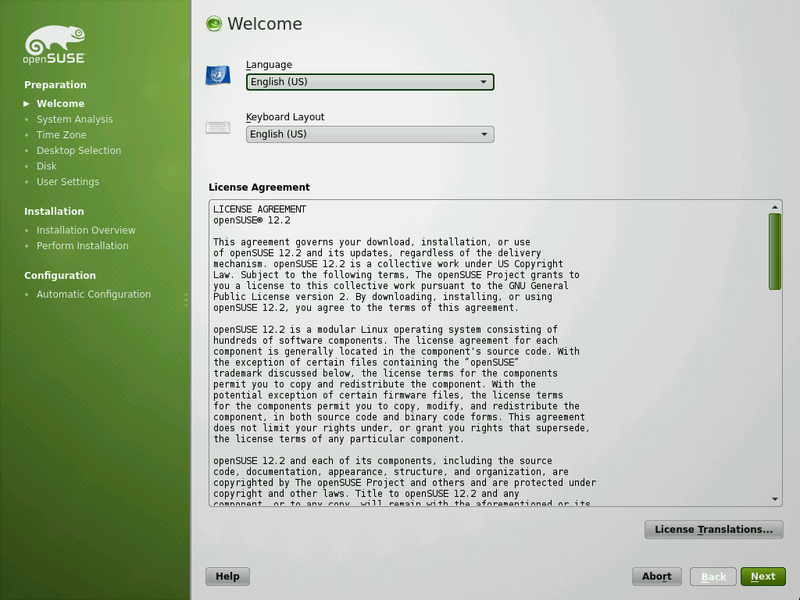Archive:Portal:12.2
(Redirected from Portal:12.2)
openSUSE Portal:12.2 Release information edit
openSUSE 12.2 was released on Wednesday September 5th 2012 and brought the best of Free Software in the familiar openSUSE package: stable and complete.
Note openSUSE 12.2 has been succeeded by openSUSE 12.3 and on Jan 15th 2014 has been discontinued its support.
Feature highlights edit
Performance
From the kernel to the desktop, openSUSE 12.2 brings you speed-ups: Linux 3.4 has a faster storage layer to prevent blocking during large transfers. glibc 2.15, the basic library, improves the performance of many functions especially on 64 bit systems. Systemd 44 enables faster booting. And KDE’s 4.8.4 releases build on Qt 4.8.1 to make the desktop and applications more responsive.
From the kernel to the desktop, openSUSE 12.2 brings you speed-ups: Linux 3.4 has a faster storage layer to prevent blocking during large transfers. glibc 2.15, the basic library, improves the performance of many functions especially on 64 bit systems. Systemd 44 enables faster booting. And KDE’s 4.8.4 releases build on Qt 4.8.1 to make the desktop and applications more responsive.
Evolution
openSUSE adopts the latest developments in Linux distribution technology as they mature. The GRUB2 bootloader is now the default, binaries are now located under /usr/bin, and during boot and shutdown Plymouth 0.8.6.1 provides flicker-free transitions and attractive animations.
openSUSE adopts the latest developments in Linux distribution technology as they mature. The GRUB2 bootloader is now the default, binaries are now located under /usr/bin, and during boot and shutdown Plymouth 0.8.6.1 provides flicker-free transitions and attractive animations.
Innovation
X.Org 1.12 introduces support for multitouch input devices and multi-seat deployments. Mozilla Firefox supports the latest Web technologies. The llvmpipe software 3D renderer enables GNOME Shell and virtual machines to use compositing even where no 3D hardware is present. GIMP 2.8 and Krita 2.4 make Free image processing and natural media painting competitive with proprietary tools. Tomahawk Player promises to make listening to music on your computer a social experience.
X.Org 1.12 introduces support for multitouch input devices and multi-seat deployments. Mozilla Firefox supports the latest Web technologies. The llvmpipe software 3D renderer enables GNOME Shell and virtual machines to use compositing even where no 3D hardware is present. GIMP 2.8 and Krita 2.4 make Free image processing and natural media painting competitive with proprietary tools. Tomahawk Player promises to make listening to music on your computer a social experience.
Stability
LibreOffice 3.5 continues to refine the Free office suite experience with many additions and improvements. Kontact Suite 4.8.4’s e-mail and calendaring applications have increased stability, while the next-generation btrfs filesystem now has improved error handling and recovery tools.
LibreOffice 3.5 continues to refine the Free office suite experience with many additions and improvements. Kontact Suite 4.8.4’s e-mail and calendaring applications have increased stability, while the next-generation btrfs filesystem now has improved error handling and recovery tools.
Management
The 3.4 kernel allows the capping of CPU usage across entire groups of processes. The new version of systemd offers a watchdog function for supervising services under its control, as well as a new process management tool. Sysadmins will benefit from a new suite of Digital Forensics/Incident Response tools.
The 3.4 kernel allows the capping of CPU usage across entire groups of processes. The new version of systemd offers a watchdog function for supervising services under its control, as well as a new process management tool. Sysadmins will benefit from a new suite of Digital Forensics/Incident Response tools.
Novelty
A set of heavyweight scientific tools brings math applications such as numeric computation, plotting, and visualization to openSUSE. The Stellarium astronomical simulator lets you explore the night sky without a telescope. Programmers will enjoy version 1.0.2 of Google's Go language, as well as the latest C++ language standards implemented in GCC 4.7.1 and Qt Creator 2.5.
A set of heavyweight scientific tools brings math applications such as numeric computation, plotting, and visualization to openSUSE. The Stellarium astronomical simulator lets you explore the night sky without a telescope. Programmers will enjoy version 1.0.2 of Google's Go language, as well as the latest C++ language standards implemented in GCC 4.7.1 and Qt Creator 2.5.
In detail edit
Discover
- Feature list · Technical overview of the updates and changes in openSUSE 12.2
- Screenshots · See what this release looks like
- Hardware requirements · What it takes to run 12.2
- Contents · The contents of the various release media
- Package List · See what software packages are included
- Release notes · Important last minute changes to the release
- Reception · See what the press has to say about this release
Documentation
- Installation · Learn about installing openSUSE in various ways
- Most annoying bugs · Find out about known issues and common problems
- Manuals · Read or download the latest edition of the openSUSE books
- Help out · File a Bugreport
Spread
- Go wild! · Meet up with the openSUSE Community and celebrate the release
- Buttons and banners · Sticker the world!
- Presentations · Spread the word
- Release announcement · Public release announcement
- Press kit · Review/Write about it
Releases edit
- Rolling release
Tumbleweedrolling - Current regular release
openSUSE Leap 15.6stable - Previous regular release
openSUSE Leap 15.5old stable
Applications edit
Browse applications:
In the news edit
Failed to load RSS feed from https://news.opensuse.org/category/distribution/feed/: Error parsing XML for RSS

